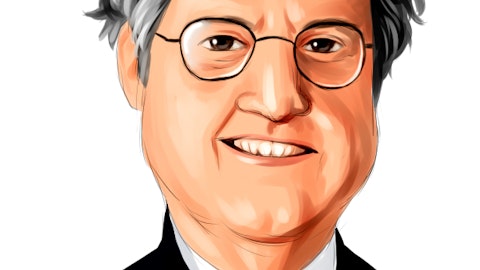Wynn Resorts, Limited (NASDAQ:WYNN) posted solid earnings this yesterday that is pushing the stock up over 5%. EPS came in at $1.48, compared to consensus of $1.31. The casino industry may finally be seeing a turnaround on strengthening demand in Las Vegas. Wynn saw its net income up 12.5% despite falling revenue in Macau. Revenue for the Chinese territory fell 4.3% for 3Q—on the back of a 7% decline in 2Q, but the company’s growth was buoyed by its Las Vegas property, with revenue up 11.8%.
Although not many insiders have found a reason to buy within the past year, a few have been selling. There was positive fund interest during 2Q, namely John Burbank upping his stake 85% to become the top fund owner by shares. Other notable fund managers upping their stakes were Steven Cohen at 800%, Ken Griffin at 290% and Ray Dalio at 380%; meanwhile Jim Simons and Ken Fisher took entirely new positions.
This “rising tide”—in this case a positive outlook by Wynn—rises all boats, including the likes of MGM Resorts International (NYSE:MGM), Las Vegas Sands Corp. (NYSE:LVS), Melco Crown Entertainment Ltd (NASDAQ:MPEL) and Penn National Gaming, Inc. (NASDAQ:PENN).
MGM called John Paulson its top fund owner by shares with 37.6 million shares, and almost 8% of MGM’s shares outstanding. Unlike Wynn, MGM saw poor Las Vegas growth but positive expansion in China for its most recent quarter. However, over 60% of the company’s revenues come from Las Vegas, which could be a positive for the company if Chinese growth continues to slow. On a cosmetic note, the company is also expected to complete remodeling of its MGM Grand and Bellagio hotels in Las Vegas.
Las Vegas Sands also operates in Las Vegas and Macau, as well as Singapore. Las Vegas Sands saw gaming revenues in Macau up 42% in 2011, yet the company is seeing a slowdown in Macau. Despite uncertain growth in China and a subpoena from the SEC, the company is still up over 20% over the last three months. Las Vegas Sands was one of Ray Dalio’s top new 2Q picks and was also a new holding of Ken Fisher, who bough almost 9 million shares.
Melco, being entirely focused on China, ended up burning Brian Kelly’s fund as China’s growth slowed. However, although the company took a plunge in 2Q, its shares have since rebounded, and are up 50% year to date. Luxor Capital upped their 1Q stake almost 8000% in 2Q and currently owns 13.7 million shares. This is very good news for Luxor, given Melco is up 25% since the end of 2Q. Although Melco is centered on the currently slowing Chinese economy, the long-term prospects for the country’s population and wealth growth remain positive, which bodes well for the gaming industry. As a result of Melco’s sole focus on China, the company will not be impacted by a continued U.S. slowdown and is expected to grow 5-year EPS at around 35% annually.
Penn National Gaming is a bit more diversified casino operator than the others, with interests in 25 gaming facilities as of the end of 2011. All the company’s locations are scattered throughout North America and the company recently opened a new facility in Ohio and is completing the acquisition of a Harrah’s facility in St. Louis. Penn is looking to continue growing aggressively with potential opportunities for a facility in Ontario, Canada, as well as considering potential opportunities in Asia and the Las Vegas Strip in the long-term.
Las Vegas is expected to carry the casino market in the near future, as 2011 visitations increased 4.3%. The opening of a new international terminal at the Las Vegas airport and continued economic strengthening should be growth drivers for the local industry. Overall sentiment for Wynn shares has been positive compared to most other casino stocks. The main concerns remain over China’s slowing growth and how that will impact the gaming industry. We remain cautiously optimistic for all the companies with exposure to China, including Wynn.
We like Melco’s future growth prospects, but believe the company has too much risk related to its China operation and would prefer to wait and see how the country’s stimulus plans impact the gaming industry. However, we believe that Penn is undervalued, trading at only 18x earnings and 1.1x sales, compared to the peer average of 25x earnings and 2.5x sales.






